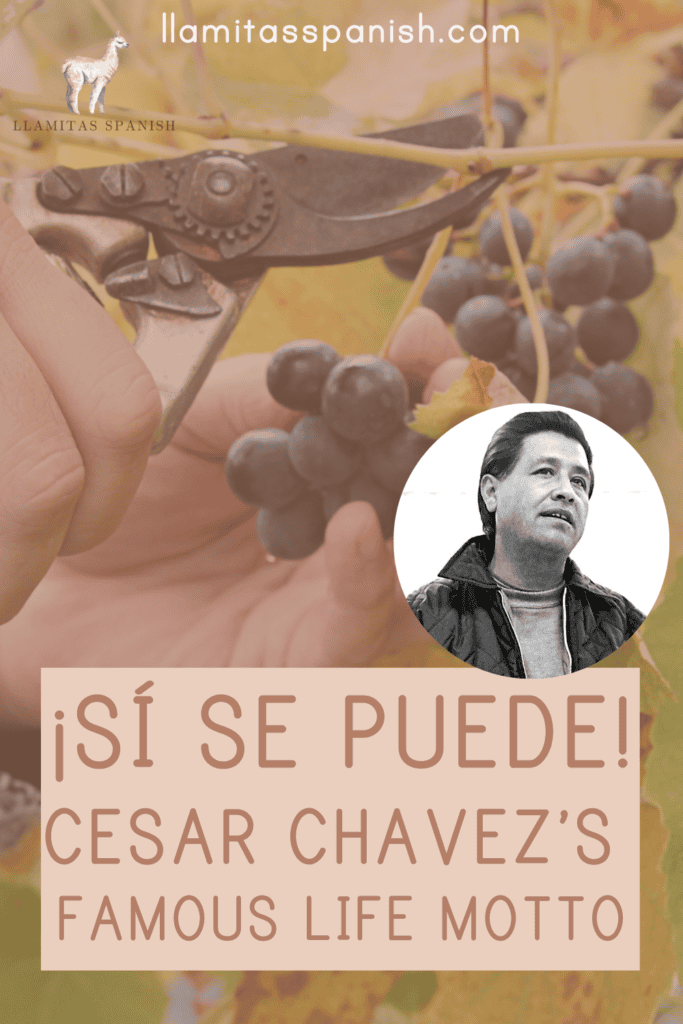In this post: Discover the life of Cesar Chavez, a Mexican-American Latino hero and civil rights activist who made history. Post contains affiliate links.
We love teaching kids about Latino heroes such as César Chavez, a civil rights activist whose name you may be familiar with.
There are hundreds of streets, schools, libraries, community centers, clinics, and locations across the United States that bear his name!

For the many families who are raising children in bilingual and bicultural households, our Llamitas Spanish curriculum, designed in sequential levels to accommodate your child’s age and learning stage, is a fundamental base.
Llamitas Spanish is rooted in Hispanic culture. We believe that a child’s Spanish language learning should go hand-in-hand with deepening their understanding of Hispanic/Latino culture. This includes learning about history, customs, and exemplary Hispanic/Latino figures who have made a positive mark on the world.
Today, let’s get to know more about Cesar Chavez, an important historical figure, and why his memory is so important.
Table of Contents
Who was Cesar Chavez?
Cesar Chavez was a Mexican-American (Chicano) farm worker who became an important civil rights activist and leader.
He founded the National Farm Workers Association to protect the rights of farm workers. He fought to improve working conditions for the people who provide fresh fruits and vegetables for individuals and families across the United States.
Cesar’s Childhood
César Estrada Chávez was born on March 31, 1927, near Yuma, Arizona. It is interesting to note that, because he grew up in the United States, and eventually became more comfortable speaking and writing in English, Cesar never included the Spanish accent marks when spelling his name.
Cesar was born in Yuma, Arizona and lived with his family in a house made of adobe that his grandfather had built generations before. His family consisted of his parents and their five children: Cesar, along with his two brothers and two sisters.
His family owned a farm and a local grocery store. Cesar enjoyed a happy and comfortable childhood as part of a large extended family, growing up with many relatives all around him. He was especially close with his brother Richard.
The Great Depression of the 1930’s
When Cesar was about 11, the Great Depression of the 1930’s was in full swing, and problems in the national economy caused his family to lose their farm and properties. The family was desperate, so they packed up all their belongings and moved to California to find work as migrant farm workers.
The life of migrant farm workers was hard. Cesar’s family had to be constantly moving to different locations to work in industrial food farms picking fruits and vegetables in California. As each crop would become ready for harvest, the family would have to move to that location to pick the food.
Everybody in the family had to work, including the children. Cesar worked in a variety of fields, picking crops such as grapes, oranges, lettuce, and beets. By the time he was 15 years old, he was already spending his entire day in the field every day.
Farm work is hard labor, and farm workers have to work from sunrise to sunset. Working conditions were very bad, and the health and happiness of the farm workers often suffered because of this. Because farm workers earned so little pay, Cesar’s family had barely enough to get by, in spite of how hard they all worked.
Cesar’s Poor Schooling
Also, the children of migrant farm workers had very little access to a good education, because their families had to move around so much and the kids themselves had to work in the fields. For example, Cesar attended 35 different schools in the few years that he worked in the fields with his family. He had difficulty at school, and his teachers often punished him for being behind in his work.
Cesar even had a teacher once that bullied him for speaking Spanish in class because he had not yet learned English. The teacher hung a sign on him that said “I am a clown. I speak Spanish.” After this very cruel experience, Cesar lost his interest in going to school, and he dropped out after completing 8th grade.
Cesar joined the Navy when he turned 19 years old, and remained enlisted for two years. In 1948, he returned home to marry his childhood sweetheart, Helen Fabela. The couple eventually had eight children.
Children’s Books about Cesar Chavez
- Harvesting Hope By Krull Kathleen Morales Yuyi ILT
Cesar’s Political Life
Cesar went back to the fields to work as a farm worker again after he married Helen. As before, the working conditions that his family and other workers had to endure were terrible.
Workers worked long hours without breaks for very little pay, with no paid holidays or health benefits. Their bosses treated them with cruelty, and they didn’t even have access to bathrooms or clean drinking water. If anybody complained, the bosses would simply just fire them and they would be out of a job.
Cesar continued to work in the fields as a farm worker for several years, taking note of the deplorable conditions that he and his fellow workers faced.
Community Service Organization (CSO)
In 1952, he finally stopped working in the fields and took an office job, working at the Community Service Organization (CSO) in San Jose, CA. There, his work focused on protecting and defending the civil rights of Latinos by helping them register to vote and by working for equal rights in the workplace.
It was during this period that Cesar became passionate about political activism and began joining forces with other organizers working to protect Latino rights and prevent discrimination against Latinos/Hispanics in the U.S.
He began to read a lot and became influenced by great civic leaders from all over the world, such as Mohandas Gandhi and Dr. Martin Luther King, Jr. He was determined to help the migrant farm workers of California to improve their working conditions and quality of life, and he was determined to achieve this without violence.
National Farm Workers Association
In 1962, Cesar quit his job in the CSO, and along with activist Dolores Huerta, Cesar founded a labor union known as the National Farm Workers Association. The organization began with only a few members, most of whom were family members.
The National Farm Workers Association became very active and was soon at the head of a pivotal labor movement in the U.S. The group organized and led protests and demonstrations to make people aware of the problems that plague migrant farm workers in their workplace.
At one point, President John F. Kennedy offered Cesar a good position in his administration as leader of the Peace Corps, but Cesar refused the offer in order to continue building his union.
Cesar’s motto in life was “Sí se puede,” which translates to “Yes, it can be done”.

A Five Year Strike
In the mid-1960s Cesar organized and launched his first major battle to improve working conditions for farm workers, a historic strike by California grape pickers, along with a corresponding boycott, that ended up lasting five years.
During the strike, the National Farm Workers Association convinced people across the entire U.S. to boycott California wines, and all products made from California grapes. The strike put enough pressure on the industrial grape farmers in California that it successfully improved conditions for their farm workers.
By 1970, most grape pickers were enjoying new labor contracts that increased their pay and provided improved health benefits. Chavez and his organization also led successful strikes and boycotts against lettuce growers and other industrial farm owners.
The National Farm Workers Association became a leader in the national battle to improve wages and working conditions for farm workers across the United States. The union grew continuously and became more and more visible. In 1971 its name was changed to the United Farm Workers of America (UFW), as it is still known today.
Hunger Strikes
Cesar and the UFW continued to work over several decades to secure workers’ rights and improved working conditions for migrant farm workers. To call national attention to his causes, Cesar often went without food as a form of protest. This type of fasting is known as a hunger strike. Cesar often went on hunger strikes to make people more aware of his causes. On one occasion he went for 36 days without food. Many celebrities joined him in refusing to eat, supporting him on his hunger strike.
Cesar was committed to the cause of helping migrant farm workers throughout his entire life, and he served as the UFW’s president until his death on April 23, 1993.
He died peacefully in his sleep on April 23, 1993, and was mourned by his community locally, regionally, and nationally. More than 50,000 people attended his funeral service. Following his death, Cesar Chavez was also awarded the Presidential Medal of Freedom in 1994.
To keep your child interested in learning more about Hispanic/Latino culture, be sure to check out our Llamitas Spanish Curricula levels!
With beautifully illustrated units, anthologies of short stories, and cultural studies, your child will develop cultural appreciation, and a love for the Spanish language!





